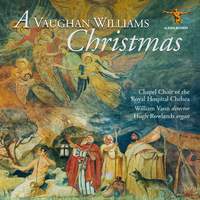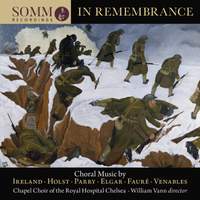Interview,
William Vann on A Vaughan Williams Christmas
 This collection of Christmas music written and arranged by Ralph Vaughan Williams stands out as something a little different from the usual festive fare; alongside well-known favourites, the Chapel Choir of the Royal Hospital Chelsea perform some lesser-known folk-inspired carols as well as original works by Vaughan Williams himself, some never before recorded. There's also a delightful set of nine carols for male voices, commissioned in 1941 for use by British troops occupying Iceland - which, likewise, see their first complete recording on this album.
This collection of Christmas music written and arranged by Ralph Vaughan Williams stands out as something a little different from the usual festive fare; alongside well-known favourites, the Chapel Choir of the Royal Hospital Chelsea perform some lesser-known folk-inspired carols as well as original works by Vaughan Williams himself, some never before recorded. There's also a delightful set of nine carols for male voices, commissioned in 1941 for use by British troops occupying Iceland - which, likewise, see their first complete recording on this album.
I spoke to the conductor William Vann about this recording, and about the Choir's particular connection with British music of this period.
The most significant inclusion on this disc is the set of nine male-voice carol settings, written for the British troops occupying Iceland in the 1940s and recorded here for the first time. They’re approachable and eminently singable arrangements; why do you think they have fallen out of use since then?
While two individual settings from this group of nine have been recorded before, this is the first recording of the set. Most choirs in the UK today, putting aside school choirs, rock choirs and Welsh male-voice choirs, are divided SATB, and the Christmas choral repertoire written in the last few decades reflects that. When Vaughan Williams produced these carols, there were many more male-voice choirs: among the forces and also, we mustn’t forget, at Cambridge University, which he had attended, where many colleges didn’t accept female undergraduates until the latter part of the 20th century. The trick many choral directors miss, though, is to vary the texture and sound-world in concerts and religious services by showcasing the separate parts of their choirs; I hope this recording might encourage some to take that risk.
As the notes mention, Vaughan Williams was concerned at least as much with the parish choir as he was with the cathedral quire. Do you think there’s a risk that performing these settings with a choir of twenty polished, professional singers can obscure elements of the folk tradition in which they mostly sit?
Many of the works on this disc were written for congregations and church choirs, and not for either folk singers or cathedral choirs who might be thought of as two very different but equally exclusive groups. Both Vaughan Williams and Percy Dearmer (in editing the Oxford Book of Carols) were anxious for as many people as possible to take part. Vaughan Williams described folk music as national music – the music of the people – and it might be argued that modern folk music styles do as much to obscure the music’s origin as arrangers and choirs might do. Our job is to present a national treasure in the best possible format, and I’m proud to have a choir composed of members whose musical and vocal assets are drawn from a wide variety of external influences. I hope you can hear that this brings out the heart and soul in this music, as well as achieving precision.
You’ve chosen sets of short works for this collection – none much over four minutes in length. What led you to focus on these, rather than larger works such as the Fantasia on Christmas Carols?
The Fantasia has been recorded fourteen times so far, and Albion’s remit is to cover new ground: do we need another? Every Albion Records production has contained world-première recordings; A Vaughan Williams Christmas is no exception and the companion disc, Earth and Sky, comprises exclusively première recordings (with the exception of one track for which a June release beat us to it). Inevitably, the list of unrecorded works by Vaughan Williams is diminishing, and many of the works on it are short, though that does not mean that they are in any way second rate! The intention of this Christmas disc was to go back to Christmas as Vaughan Williams himself knew it, stripping away the developments in Christmas music that have taken place over the past 90 years. The Oxford Book of Carols for instance, has been a great resource, inspiring talented composers to make new arrangements, but many of those carols are not so often performed in that 1928 published form.
The sleeve notes also mention Vaughan Williams’ great interest in the poetry and texts he was setting, and there are certainly some big literary names here – William Blake and William Morris in particular. How much (if it’s possible to answer!) do you think the text helped to shape the music in Vaughan Williams’ responses to these lyrics?
Vaughan Williams was probably the most widely read composer that this country has ever seen. He preferred setting words by “the old masters” to newly commissioned poetry, but in fact set a good deal of new poetry as well. He wrote, in 1920, that the object of all art is to obtain a partial revelation of what is beyond human sense and human faculties – so his sheer honesty would have compelled the meaning of the words to be reflected in the music. The really interesting thing about the carol “Snow in the Street”, is that these are the only words by William Morris that Vaughan Williams ever set – and of course he found them in the middle of a very long cycle of poetry. Blake was a much bigger influence, and Vaughan Williams shared his search for a ‘new Jerusalem’; Blake’s Cradle Song in this collection is drawn from his Songs of innocence which deal with the innocence of a young child in a corrupt world; this is the starting point for that search. Vaughan Williams’s response to that text is to create a stunningly beautiful, simple solo melody in E flat major. But each solo verse is surrounded by a quasi-ritornello in the relative minor, gently rocking, but also weeping, just as the mother weeps for her child. Blake’s six verses take us on a journey: from pondering a simple mother-baby relationship to contemplating the depths of Christian theology. The strophic setting is a masterstroke: connecting us to the divine, yet still within our garments of deeply felt, but uncertain human existence.
This is the Chapel Choir’s third recording in fairly rapid succession, and all three have concentrated on British composers of roughly Vaughan Williams’ time – some earlier and some later. Is this British focus connected with the Royal Hospital’s relationship with the British Armed Forces, or driven simply by repertoire interests?
There are elements of both: our In Remembrance disc, recently out on SOMM Recordings, focused on much that has associations with Remembrance, or 1918 in particular. Three tracks feature a choir of Chelsea Pensioners singing alongside the Chapel Choir, and Holst’s 1918 Ode to Death, written as a reaction to the war, is the longest piece. The Vaughan Williams works on Earth & Sky that date from the war years persist with that theme, though ultimately that disc and A Vaughan Williams Christmas have come about because of my intense interest in his works, and in particular vocal works. I’ll be recording two albums of Vaughan Williams and Holst songs for Albion later this year, and then in 2019 I’ll be committing Parry’s Judith to disc for the first time with Chandos, so I’ll be knee-deep in English choral and vocal repertoire for the foreseeable future!
A Vaughan Williams Christmas was released on Albion Records on 12th October.
Available Formats: CD, MP3, FLAC, Hi-Res FLAC
In Remembrance, which features choral music by Ireland, Parry, Venables and others, was released on Somm in September.
Available Formats: CD, MP3, FLAC, Hi-Res FLAC




